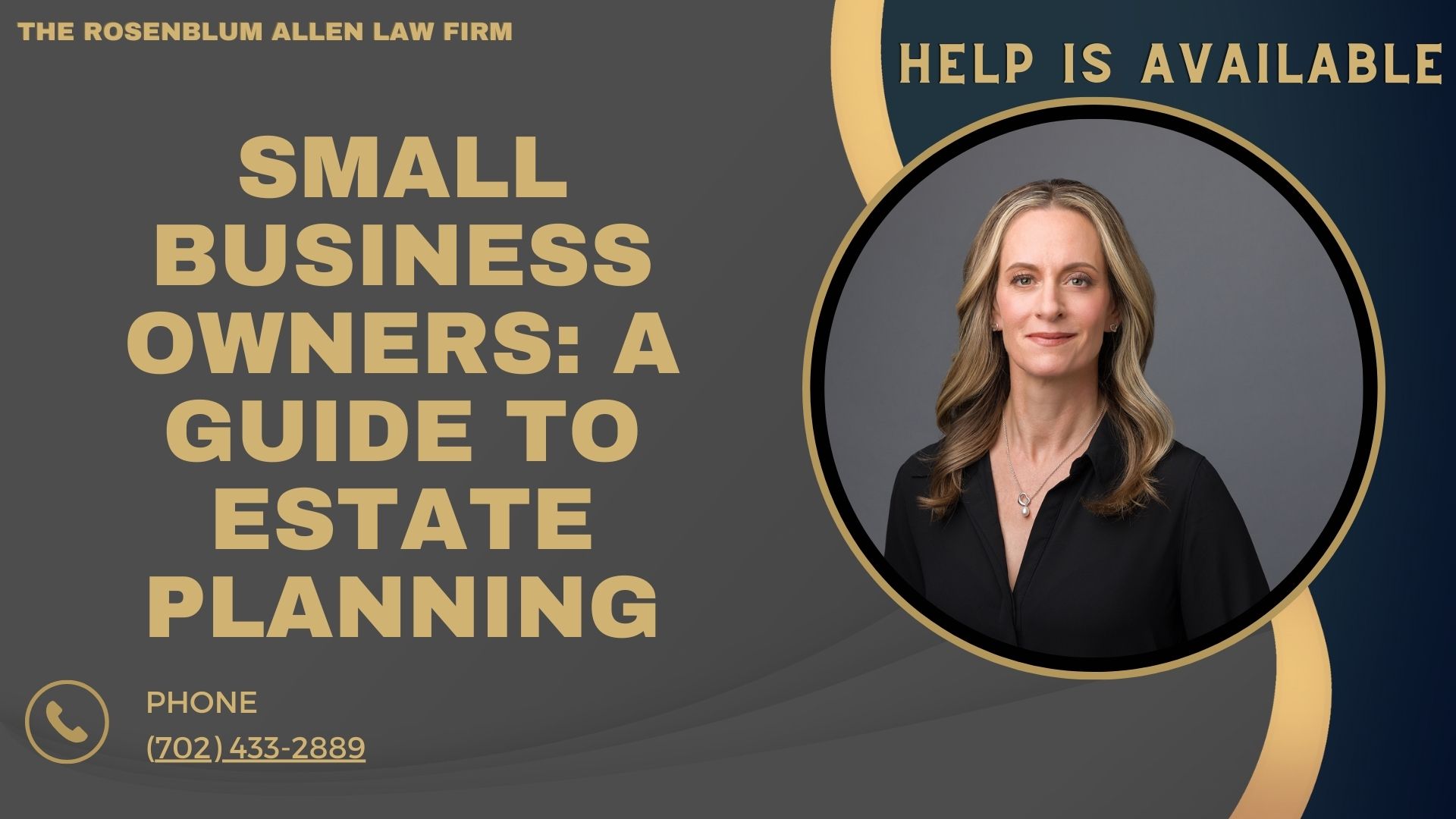Understanding Estate Planning for Small Business Owners
Why Estate Planning Matters for Business Owners
Estate planning isn’t just for the wealthy or elderly. It’s a crucial step for every small business owner. Here’s why:- Protects your business legacy
- Ensures smooth transition of ownership
- Minimizes tax burdens on your heirs
- Provides for your family’s financial security
- Maintains business continuity during unexpected events
Critical Components of a Business Owner’s Estate Plan
A comprehensive estate plan for a small business owner typically includes:- Last Will
- Revocable Living Trust
- Power of Attorney (Financial and Healthcare)
- Buy-Sell Agreement
- Business Succession Plan
- Life Insurance Policies
- Digital Asset Management Plan

Creating a Comprehensive Business Succession Plan
Identifying and Preparing Successors
Choosing who will take over your business is one of your most critical decisions. Here are some steps to consider:- Assess potential successors’ skills and interest
- Provide training and mentorship opportunities
- Gradually increase their responsibilities
- Introduce them to key clients and partners
- Develop a timeline for the transition
Developing a Management Transition Strategy
A smooth transition doesn’t happen overnight. It requires careful planning and execution:- Create a detailed transition timeline
- Document key processes and procedures
- Cross-train employees in critical roles
- Establish clear communication channels
- Set benchmarks to measure the transition’s success
Addressing Family Dynamics in Succession
Family businesses come with their own set of challenges. Here’s how to navigate them:- Communicate openly and honestly about your plans
- Set clear expectations for family members involved in the business
- Consider creating a family business constitution
- Establish a family council to discuss business matters
- Seek outside mediation if conflicts arise
Legal Documents for Business Estate Planning
Let’s face it: legal documents aren’t the most exciting part of running a business. But they’re crucial for protecting your legacy. Think of them as the foundation of a house – not glamorous, but essential.Last will
Your will is like the final chapter of your business story. It outlines:- Who inherits your business assets
- How your assets are distributed
- Who will be the guardian of your minor children
- Your final wishes for the business
Revocable Living Trust
A revocable living trust is like a safety deposit box for your assets. Here’s why it’s valuable:- Avoids probate, saving time and money
- Keeps your business affairs private
- Allows for flexible management of assets
- Can be changed or revoked during your lifetime
Power of Attorney
Financial Power of Attorney
This document is your financial wingman. It allows someone to:- Make financial decisions for your business
- Pay bills and taxes
- Manage investments
- Handle banking transactions
Healthcare Power of Attorney
While not directly related to your business, this is crucial for you as a business owner. It:- Designates someone to make medical decisions for you
- Ensures your healthcare wishes are respected
- Provides peace of mind for you and your family
Tax Considerations in Estate Planning
Taxes – the word alone can make business owners break out in a cold sweat. But with thoughtful planning, you can minimize their impact on your estate.Minimizing Estate Taxes
The goal is to pass on as much of your hard-earned wealth as possible. Consider:- Gifting strategies during your lifetime
- Setting up trusts to reduce taxable estate
- Charitable giving to offset tax liabilities
- Using life insurance to cover estate tax bills
Utilizing Tax-Efficient Strategies
Think of these as legal loopholes (the good kind). Some options include:- Family Limited Partnerships (FLPs)
- Grantor Retained Annuity Trusts (GRATs)
- Intentionally Defective Grantor Trusts (IDGTs)
- Qualified Personal Residence Trusts (QPRTs)
Understanding Federal and State Tax Laws
Tax laws are like the weather – constantly changing. Stay informed about:- Federal estate tax exemption limits
- State-specific inheritance taxes
- Gift tax annual exclusion amounts
- Generation-skipping transfer tax rules
Valuation and Protection of Business Assets
Your business is more than just a collection of assets – it’s your life’s work. Let’s make sure it’s appropriately valued and protected.Conducting a Professional Business Valuation
Getting your business valued is like getting a physical for your company. It:- Provides an accurate picture of your business worth
- Helps in estate planning and tax strategies
- Assists in buy-sell agreements
- Guides succession planning decisions
Protecting Intellectual Property
Your ideas are gold. Protect them with:- Patents for inventions
- Trademarks for brands and logos
- Copyrights for creative works
- Trade secret protections
Addressing Business Debts and Liabilities
Debts don’t disappear when you do. Plan for them by:- Maintaining adequate life insurance
- Setting up sinking funds for known liabilities
- Structuring your business to limit personal liability
- Creating a debt repayment plan as part of your succession strategy

Insurance and Liquidity Planning
Let’s talk about safeguarding your business and ensuring enough cash to keep things running smoothly, even when life throws a curveball.Life Insurance Strategies for Business Owners
Think of life insurance as your business’s safety net. It’s not the most exciting topic but a game-changer when needed. Here’s how it can help:- Provides funds for business continuity
- Covers estate taxes
- Facilitates buy-sell agreements
- Offers key person protection
Ensuring Business Continuity
Keeping your business running like a well-oiled machine, even in your absence, is crucial. Here’s how to do it:- Create a detailed business continuity plan
- Cross-train employees on critical tasks
- Maintain updated standard operating procedures
- Set up emergency communication protocols
- Regularly review and update your plan
Creating Liquidity for Estate Taxes
Estate taxes can be a real buzzkill for your heirs. But with some intelligent planning, you can ensure they don’t have to sell the business to pay Uncle Sam. Consider:- Setting up an Irrevocable Life Insurance Trust (ILIT)
- Creating a sinking fund for tax liabilities
- Exploring installment payment options for estate taxes
- Leveraging charitable giving strategies
Digital Asset Management in Estate Planning
In today’s digital age, your online presence is as significant as your physical assets. Let’s protect your digital legacy, too.Identifying Digital Business Assets
Take a moment to think about all your digital assets. They might include:- Website domains and hosting accounts
- Social media profiles
- Online payment systems
- Cloud-based software subscriptions
- Digital intellectual property

Creating a Digital Asset Inventory
It’s time for a digital spring cleaning! Create an inventory that includes:- Asset name and type
- Login credentials (stored securely)
- Account numbers or subscription IDs
- Renewal dates
- Estimated value
Designating Digital Executors
Choose someone tech-savvy to manage your digital legacy. Their responsibilities might include:- Accessing and managing online accounts
- Transferring or closing digital assets
- Ensuring continuity of digital business operations
- Protecting sensitive online information
Working with Professionals
Estate planning isn’t a DIY project. It’s time to build your dream team of advisors.Collaborating with Estate Planning Attorneys
An estate planning attorney is like an architect for your legacy. They can help:- Draft legally binding documents
- Navigate complex estate laws
- Implement tax-saving strategies
- Ensure your plan aligns with your goals
Consulting Financial Advisors and CPAs
These professionals are the number crunchers of your estate plan. They can:- Provide financial projections
- Optimize tax strategies
- Advise on investment decisions
- Assist with business valuations
Regular Review and Updates of Estate Plans
Your estate plan isn’t a “set it and forget it” deal. Life changes and your plan should, too. Schedule regular reviews:- Annually for a quick check-up
- Every 3-5 years for a comprehensive review
- After major life events (marriages, births, deaths)
- When tax laws change significantly

Communicating Your Estate Plan
You’ve done the hard work of creating your estate plan. Now comes the crucial part: making sure everyone understands it. Clear communication can prevent many headaches (and potential family feuds).Informing Family Members and Key Stakeholders
Think of this as the “family meeting” of estate planning. It might feel awkward, but it’s essential. Here’s how to approach it:- Choose the right time and place
- Be transparent and honest about your decisions
- Explain your reasoning behind critical choices
- Allow for questions and discussion
- Be prepared for emotional reactions
Documenting Business Processes and Knowledge
Your business knowledge is like a secret recipe. Don’t let it disappear with you. Create a “business bible” that includes:- Standard operating procedures
- Client relationships and history
- Vendor contracts and contacts
- Employee information and roles
- Financial processes and passwords
- Future business plans and strategies
Storing and Accessing Important Documents
Now that you’ve got all these essential documents, where do you put them? Consider:- A fireproof safe at home or office
- A safety deposit box at a bank
- Secure cloud storage for digital copies
- Copies with your attorney or executor

Breaking It All Down For You
You’ve just taken a deep dive into the world of estate planning for small business owners. It might have felt like climbing a mountain at times, but you’ve reached the summit. Let’s take a moment to appreciate the view.
Estate planning isn’t just about preparing for the worst. It’s about ensuring the best for your business and your loved ones. It’s the ultimate act of leadership – guiding your enterprise even when you’re no longer at the helm.
Remember:
- Your business is your legacy. Protect it.
- Communication is key. Keep your family and stakeholders in the loop.
- Flexibility is crucial. Review and update your plan regularly.
- You don’t have to go it alone. Lean on professionals for guidance.
You’re not just putting papers in order as you implement your estate plan. You provide peace of mind, preserve your life’s work, and pave the way for your business to thrive for generations.
So, take a deep breath. You’ve done something incredible here. You’ve faced the future head-on and taken control. Your business – and your family – will thank you for it.
Now, go out there and keep building your empire. But do it with the confidence that you’ve secured your legacy. After all, isn’t that what being a successful business owner is all about?
Here’s to your business, your future, and the lasting impact you’ll make. Well done, entrepreneur, and well done indeed.

Frequently Asked Questions
What is the difference between a will and a trust for business owners?
A will is a legal document that outlines how your assets should be distributed after your death, while a trust is a legal entity that can hold and manage assets during your lifetime and after your passing. A trust can offer business owners more control over asset distribution and potentially avoid probate.
How often should I review my estate plan?
It is recommended that you review your estate plan every 3-5 years or after significant life events such as marriages, divorces, births, deaths, or major changes in your business or financial situation.
Can I use life insurance to fund a buy-sell agreement?
Yes, life insurance is a standard funding method for buy-sell agreements. It provides liquidity for the remaining partners to purchase the deceased owner’s share of the business.
What is a family limited partnership (FLP), and how can it benefit my estate plan?
An FLP is a legal entity that allows you to transfer business interests to family members while maintaining control. It can reduce estate taxes by allowing you to transfer assets at a discounted value.
How can I protect my business from creditors through estate planning?
Strategies like creating a trust, establishing an LLC, or using asset protection techniques can help shield your business assets from personal creditors.
What's the role of a business valuation in estate planning?
A professional business valuation helps determine your business’s fair market value, which is crucial for accurate tax planning, setting up trusts, and creating buy-sell agreements.
How can I ensure my business continues to operate if I become incapacitated?
Establishing a durable power of attorney for business decisions and creating a comprehensive succession plan can help ensure business continuity in case of incapacitation.
What are the benefits of gifting business interests during my lifetime?
Gifting business interests can reduce the size of your taxable estate and potentially lower estate taxes. It also allows you to take advantage of annual gift tax exclusions.
How does estate planning differ for sole proprietors versus partnerships or corporations?
The structure of your business affects how it’s treated in your estate plan. Sole proprietorships are typically considered personal assets, while partnerships and corporations may require more complex planning to address ownership transfers and business continuity.
What's the importance of digital asset planning for business owners?
Digital asset planning ensures that your online business accounts, intellectual property, and digital records are appropriately managed and accessible to your successors.
How can I incorporate charitable giving into my business estate plan?
Charitable giving can be integrated through various methods, such as creating a charitable trust, setting up a foundation, or making direct bequests in your will. These can provide tax benefits while supporting causes you care about.
What steps should I take to prepare my business for sale as part of my estate plan?
Preparing your business for sale involves:
- Organizing financial records.
- Addressing any legal issues.
- Developing a solid management team.
- Potentially hiring a business broker or M&A advisor.

Additional Resources for You from The Rosenblum Allen Law Firm
Molly Rosenblum, Esq., our esteemed lead attorney, has diligently developed a suite of comprehensive resources dedicated to assisting you with your estate planning needs. These resources, thoughtfully curated and accessible through the Rosenblum Law website, offer a wealth of knowledge and guidance on various aspects of estate planning. Here’s an overview of the resources available to help you in your planning process:
Las Vegas Estate Planning Attorney: A specialized resource providing insights and legal guidance specifically about estate planning in Las Vegas. Explore the resource.
Las Vegas Trust Attorney: Detailed information and guidance on setting up and managing trusts, a critical component of estate planning. Learn more.
Tips On Estate Planning: Valuable advice and strategies to ensure your estate planning is comprehensive, up-to-date, and tailored to your unique needs. Read the tips.
Estate Planning Checklist: A thorough checklist to help you keep track of all the essential steps in the estate planning process. Check your list.
Making a Will: Guidance on creating a will, ensuring your assets are distributed according to your wishes. Start drafting your will.
Estate Planning Services: An overview of the various estate planning services offered, designed to meet your specific needs. View the services.
Estate Planning Mistakes: Information on common estate planning pitfalls and how to avoid them, ensuring a smooth and effective planning process. Learn what to avoid.
Estate Planning Probate: Insights into the probate process and how effective estate planning can help navigate or simplify this often complex procedure. Understand estate planning probate.
Molly Rosenblum, Esq., through these carefully prepared resources, strives to empower you with the knowledge and tools necessary for thorough and informed estate planning. We encourage you to utilize these resources, ensuring that your estate planning journey is as comprehensive and informed as possible.

Offsite Resources You May Find Helpful
Nevada Secretary of State: Business Center: This official state resource provides information on starting, managing, and growing a business in Nevada.
American Bar Association: Estate Planning FAQs: This page provides answers to frequently asked questions about estate planning, including information on wills, trusts, and power of attorney.
IRS: Estate Tax: This is the official IRS page on estate taxes, providing up-to-date information on rules and regulations.
SCORE: Estate Planning for Small Business Owners: SCORE is a nonprofit association dedicated to helping small businesses get off the ground, grow, and achieve their goals through education and mentorship. They have resources on a variety of topics, including estate planning.
Investopedia: Estate Planning: This resource provides a comprehensive overview of estate planning, including how it can help protect a small business.

A Special Message from Our Lead Attorney, Molly Rosenblum Allen, Esq

Dear Reader,
Thank you for taking the time to read through our comprehensive guide on estate planning for small business owners. We hope you’ve found this information valuable and insightful as you consider the future of your business and personal legacy.
At The Rosenblum Allen Law Firm, we understand that every business owner’s situation is unique. You’ve worked hard to build your enterprise, and you deserve an estate plan that’s tailored to your specific needs and goals.
If you’re ready to take the next step in securing your business legacy and ensuring peace of mind for yourself and your loved ones, we’re here to help. Our team of experienced attorneys specializes in estate planning for small business owners in Las Vegas. To get started on your personalized estate plan, please give us a call at (702) 433-2889.
We’re looking forward to learning about your business and helping you create a robust estate plan that protects everything you’ve built.
Best regards,
Molly Rosenblum, Esq.
The Rosenblum Allen Law Firm




